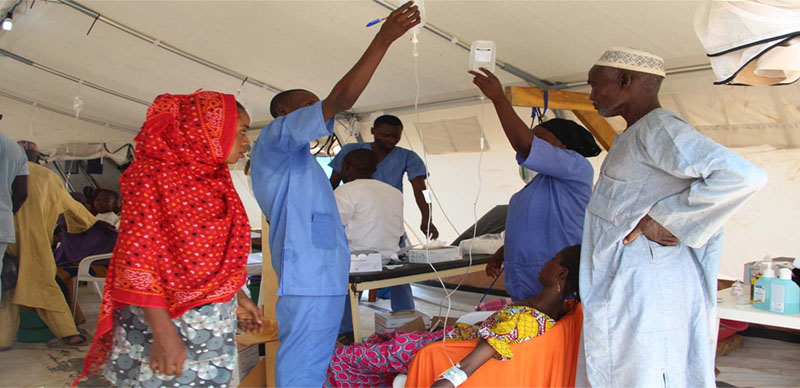
Patients being treated for cholera. Photo: MSF
President Bola Tinubu has directed the Federal Executive Council, FEC, to set up a committee to oversee the cholera emergency operation centre operated by the National Centre For Disease Control, NCDC.
The Minister of Health, Dr Ali Pate, disclosed this while briefing State House correspondents at the end of the council meeting presided over by the President at the Council Chamber, Presidential Villa, Abuja.
He also disclosed that the cabinet committee would comprise members from the Federal Ministry of Health, Finance, Water Resources, Environment, Youth, Aviation and Education.
He added that the committee’s effort was in addition to state government support to ensure Nigeria made progress in reducing open defecation.
The minister said: “The council then approved a cabinet committee comprising the federal ministries of health, ministry of finance, water resources, environment, youth, aviation, and education because some of our children will be returning to school.
“In addition to this, the state governments will be co-opted so that Nigeria makes progress in reducing open defecation because cholera is a developmental issue that requires a multi-sectoral approach.
“The President directed that cabinet committee be set up to oversee what the emergency operation centre led by NCDC is doing and for the resources to be provided, complemented by state governments.”
The minister said that at the moment, 31 states had recorded 1528 cases in Nigeria with 53 deaths.
“At the moment about 31 states have recorded 1528 cases and 53 deaths in Nigeria that is what we are working on through the emergency operation centre that was activated by NCDC on Monday.
“Now we have a cholera outbreak and we discussed it extensively in the Council in addition to a new emergence of yellow fever specifically in Bayelsa State.
“On cholera, we are in the middle of the 7th pandemic globally which is …decades in the making in 2022 the world had almost 500,000 cases of cholera so it is not only peculiar to Nigeria. In 2023 almost 700,000 cases of cholera were reported by the World Health Organisation. This year, more than 200,000 cases have occurred in five regions of the World,” he added.
He also emphasised that a multi-sectoral approach was required to tackle the outbreak.
Meanwhile, as Nigeria faces a critical sanitation challenge with the cholera outbreak, health experts have called for a multi-pronged approach, by prioritising sanitation and enforcing regulations against open defecation.
The experts, who said the persistence of open defecation was jeopardizing the nation’s commitment to ending it by 2025, harped on promoting behaviour change for the country to get back on track to meet its sanitation targets and ultimately save lives.
They acknowledged the need for a shift in strategy, emphasizing the importance of creating demand for toilets alongside construction efforts.
Nigeria currently ranks No. 1 globally among countries with the highest number of people defecating in the open space and is widely off track to meet the target set by the Sustainable Development Goals, SDGs, and is crucial to prevent waterborne diseases such as cholera.
As of June 24, 2024, the National Centre for Disease Control and Prevention, NCDC, reported 1,528 suspected cases of cholera and 53 deaths across 31 states and 107 LGAs in Nigeria since the beginning of the year. The case fatality rate is 3.5 per cent.
The NCDC has also placed Nigeria at high risk for increased cholera transmission and impact due to the rainy season.
Open defecation, or the act of defecating in open-air locations, instead of in covered ones, is a widespread practice in Nigeria, creating a perfect storm for cholera outbreaks.
In 2021, the Water, Sanitation, and Hygiene National Outcome Routine Mapping, WASH-NORM report estimated that 48 million Nigerians, or 23 per cent of the population, still practised open defecation, while only 8 per cent practised hand washing.
According to a public health expert, Dr Casmier Ifeanyi, Nigeria has continued to pay lip service to water, sanitation, and hygiene, WASH.
Ifeanyi stated: “I challenge you to go and dig it up. Of the 30 states already reported to have the outbreak, how many of them have a public potable water supply in place? I can categorically tell you none.
‘’So, we do know that cholera is a disease that thrives where water, sanitation, and hygiene are at its low rate.’’
Calling for the country to speak to issues, he emphasised the need for improved WASH practices, including addressing open defecation and ensuring access to clean water which are essential for preventing future outbreaks.
“Most public places lack toilet facilities, and individuals who perpetrate this act of open defecation lack knowledge of the health implication.’’
Also speaking, another public health specialist, Dr. Isaac Egboja, blamed the outbreak of cholera on open defecation in almost all the affected states in Nigeria.
“There is open defecation in nearly all the states that are affected, and during this time of the year, when rain falls, the faeces are carried to streams, ponds, open wells, and other water sources, and these are means of contamination.
“This isn’t just about deadlines; it’s about protecting the health and well-being of millions of Nigerians. The fight against cholera and other waterborne diseases hinges on winning the battle against open defecation. It’s a fight Nigeria must win for a healthier future,’’ he said.











